11. Payday – Daryl Duke – 1973
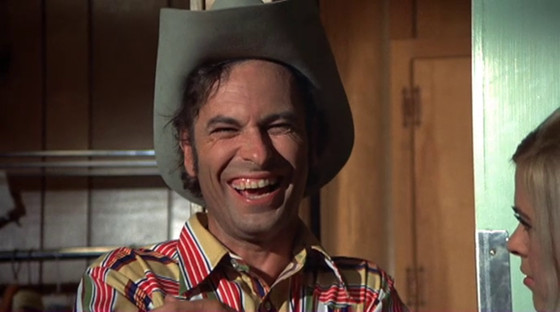
A film well worthy of a remastering and elevation in status – the little seen Payday is a masterpiece of degeneration, a filthy ride through the scuzzy underbelly of the music tour biz. Our protagonist Maury Dann (Rip Torn on absolute fire) is a lower tier country singer, riding on the coast of fading glories, pressing the self destruct button and watching everything spiral out of control in a precursor to the desperate day in the life downfall of Abel Ferrera’s Bad Lieutenant.
We join Dann as he tours around the south in his Cadillac, searching for his payday through a seedy twilight world of card games and bleak drinking pits. Selling out anyone and everyone to keep himself pickled in booze and drugs, a Hunter S Thompson without the talent, this is a gonzo trip of the darkest hue. Somewhat unique as a road movie, with it largely focussing around Dann issuing megalomaniacal drug addled dictates from the back seat of his limo, a set up that would be seen 40 years later in David Cronenberg’s Cosmopolis.
12. Scarecrow – Jerry Schatzberg – 1973
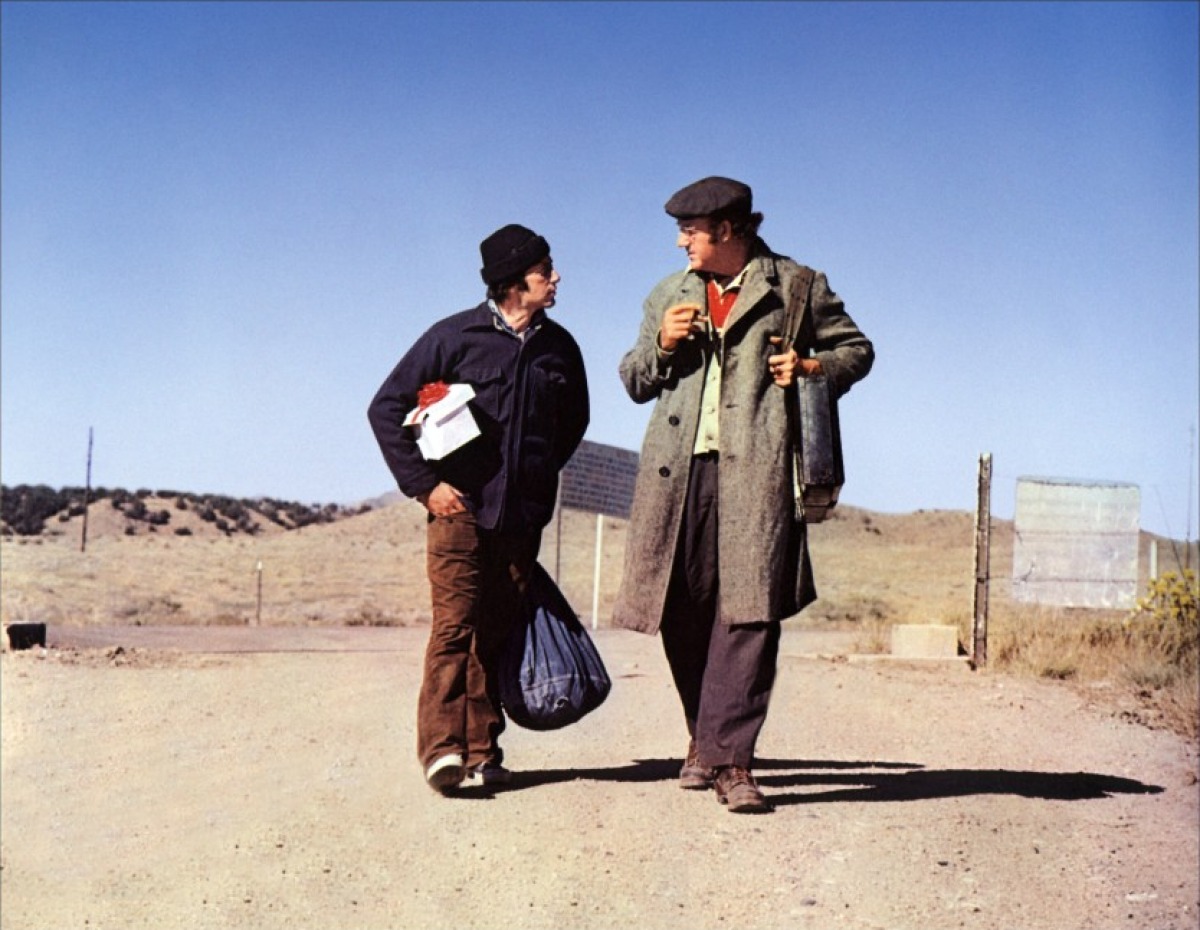
A film that has found itself given a fresh lick of remastering paint and a reappraisal of late is this soulful entry from Jerry Schatzberg.
Schatzberg reteams with Al Pacino whom he had worked with two years previously on the bleak junkie study The Panic in Needle Park. Pacino is ‘Lion’ Delbuchi, a sailor who whilst trying to hitch a ride somewhere in deepest California – forms a bond with fellow down and out Max (Gene Hackman) an ex-convict with a grudge against the world.
Lion is trying to get to Detroit in an attempt to win back his estranged wife and the child he fathered but has yet to meet, along the way Max involves him in several doomed money making schemes before heading towards an inconclusive but touching ending.
A synopsis makes this sound like a buddy comedy pic, but whist there are moments of humour, this is a picaresque wander through the American heartland worthy of Steinbeck, complimented by Vilmos Zsigmond’s wonderful autumnal cinematography.
13. Slither – Howard Zieff – 1973
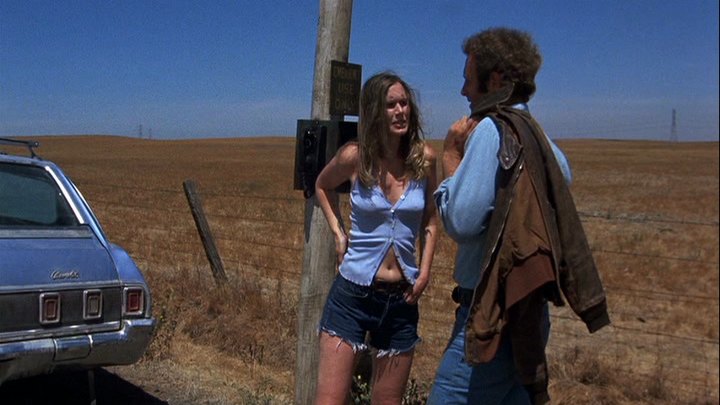
Another oddball pic of the kind they could only get away with in the early 70s, Slither takes a caper template, following a group of misfits on the hunt for some stashed loot, and adds a layer of comic absurdity to the proceedings. In many ways it acts as a precursor to the films of the Coen Brothers some 15-20 years later.
The plot is too convoluted to succinctly describe here, though that’s not necessarily to the film’s detriment. This has the freewheeling money hunt of It’s a Mad Mad Mad Mad World, but removes the bloat and adds a layer of early 70’s hazy greened up irreverence and paranoia.
Importantly, without exception the cast seem to ‘get it’ and this leads to a charming slice of screwball idiosyncrasy that stands the test of time.
14. Bring Me the Head of Alfredo Garcia – Sam Peckinpah – 1974
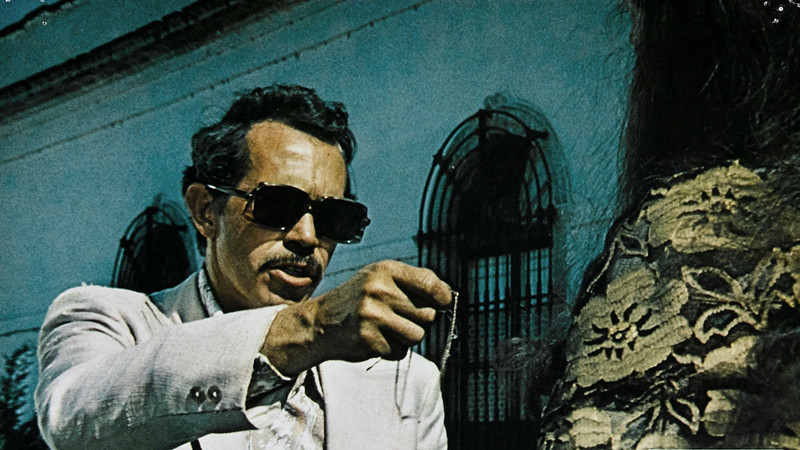
The ultimate realisation of Peckinpah’s bleak world vision, Bring Me the Head of Alfredo Garcia follows Bennie (a never better Warren Oates) a down on his luck ivory tinkling barfly. He thinks his luck has changed when he hears of a price on the head of the titular character, Bennie just happens to know that Mr Garcia is already dead and Bennie’s girlfriend knows where the body is buried. An increasingly surrealistic odyssey down into Mexico follows, double crossings and murders pile up and Bennie ends up screaming across Mexico with the rotting fly magnet that is Garcia’s decapitated head as his only companion and confidant.
Nobody knew what to do with Peckinpah, controversy trailed after The Wild Bunch and Straw Dogs whilst The Getaway and Pat Garrett & Billy the Kid saw his vision neutered by the studios. Finally somebody saw fit to throw $1.5 million at him, and with such a low investment involved, allow him to finally let his unforgiving universe spill onto the screen in all its uncut horror.
The result unashamedly spits on the human condition. This is a sadistic, gleefully misogynistic, booze soaked descent into the blackest nihilistic hell, not one that will be forgotten in a hurry.
15. Dirty Mary Crazy Larry – John Hough – 1974
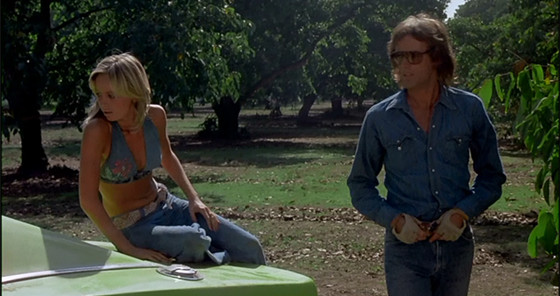
Whilst on the surface Dirty Mary Crazy Larry echoes earlier films from the decade, with a trio of anti-heroes attracting unwanted police attention in a muscle car death-trip leading to a bleakly comic deus-ex-machina. The film wears their dressing but lacks the social conscience of the earlier films and represents the beginning of the end for the period of the Odyssean wanderers, and the embrace of the sheer spectacle of the car chase.
Our not particularly likeable trio are Larry (Peter Fonda), Deke (Adam Rourke) and Mary (Susan George). Larry and Deke are obsessed with accruing the money to form a NASCAR team, this results in them holding up a local supermarket. Mary, a former one night stand of Larry’s joins them as they attempt to escape the clutches of Sheriff Franklin (Vic Morrow) and the local police force.
Whilst the chase is entertaining enough, and Vic Morrow takes the bumbling local Sheriff cliché and applies a distinctive blackly comic threatening edginess. Unfortunately, our obnoxious protagonists and their ridiculous scheme deny this the status of the true classics of the genre.
16. Gone in 60 Seconds – H.B. Halicki – 1974
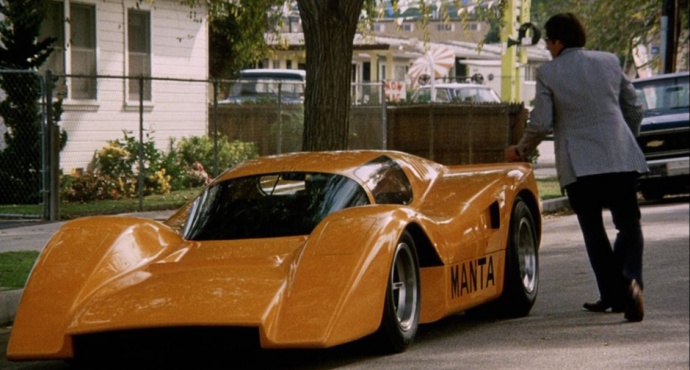
During this epoch for the chase flick, here is the most audacious and awe-inspiring of the lot. The director H.B. Halicki, once described as “the Orson Welles of car chase movies” was a brash Southern Californian cult of personality, blagging friends and associates to lend their money and their cars to a project of inspired excessive lunacy. Somehow this former towing company owner talked five separate Los Angeles townships into letting him run riot through their streets.
The first half of the film is just a fairly rote potboiler about a car thief Maindrian Pace (Halicki himself), whose primary target is ‘Eleanor’ (a startling yellow Ford Mustang from the tail end of the muscle era). Pace eventually finds his Eleanor but the police have been tipped off. The resulting 34 minute car chase that takes up the second half of this drive-in classic took over seven months to film.
Halicki’s unwavering commitment to bringing the craziest possible car spectacles to the screen meant that his body of work was limited. 1982 saw the release of The Junkman, where plot is pretty much completely excised in lieu of a barrage of car stunts, but proves you can have too much of a good thing. He had just begun filming a direct sequel to Gone in 60 Seconds in 1989 when he was unfortunately killed during one of the production’s early stunts. A big budget slick and empty remake came along in 2000 with nary an ounce of the charm or danger of the original.
17. Harry and Tonto – Paul Mazursky – 1974
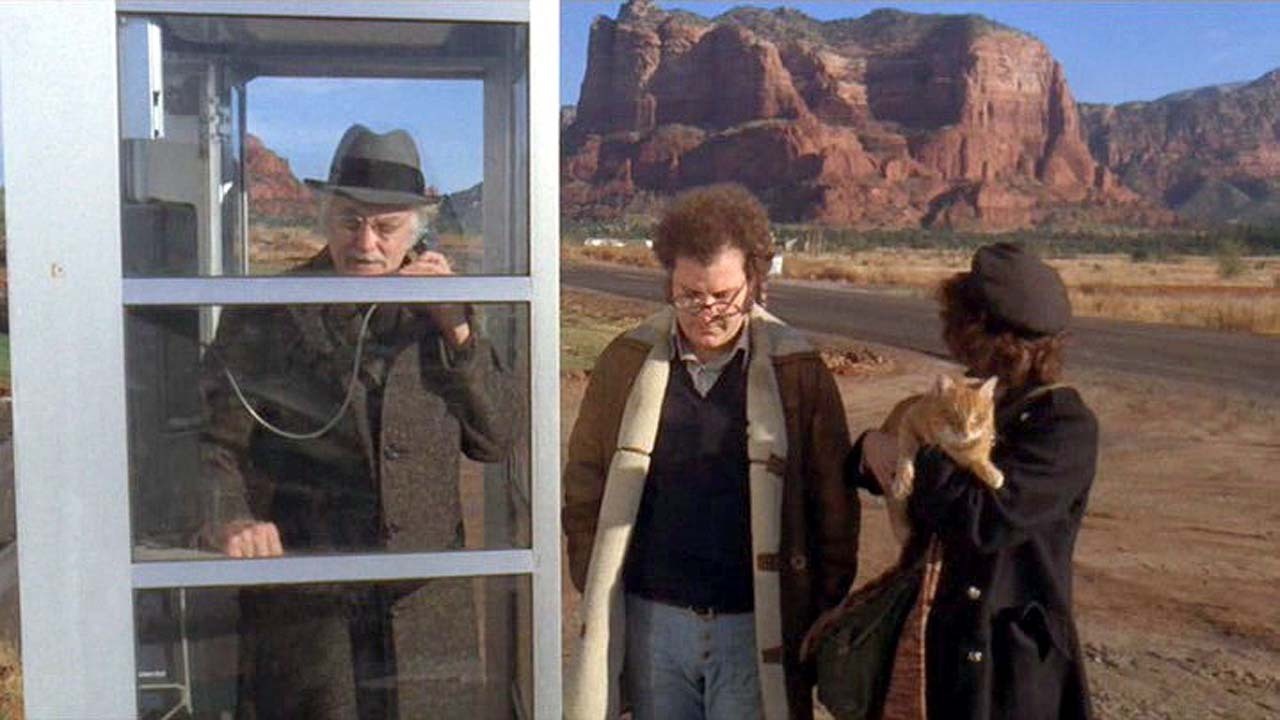
A one off in the road movie genre, in that this is a film about one man and his er… cat.
The film is also rare within the genre in that Art Carney (the titular Harry) won the best actor Oscar for his performance. Predictably then, this isn’t a yeehaw moonshining escape from the county mounties sort of road movie. But rather a quietly affecting picture about a widowed retiree who having to leave his soon to be torn down apartment chooses to partake in a cross country odyssey with his elderly pet cat Tonto, visiting family and old friends and becoming embroiled in various misadventures along the way.
To use the most obvious set of cliché terms for such a movie, this is a heart-warming, touching little adventure. Carney’s role would become the patient zero for the ‘bemused elder statesmen traversing the country on bittersweet adventures’ trope that would be most successfully adopted later in David Lynch’s The Straight Story and several of the works of Alexander Payne, namely About Schmidt and Nebraska.
18. Road Movie – Joseph Strick – 1974
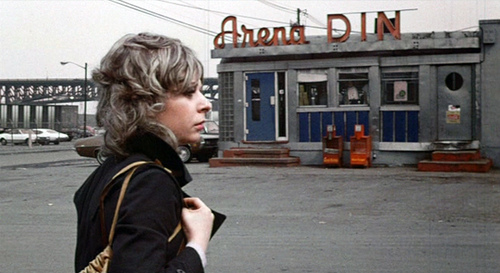
During the 1970s the long haul trucker became the new torch holder for the American frontier myth, the last remaining cowboys tied to the nation’s pioneer spirit. This was seen in the CB craze that swept the nation throughout that decade, and the trucker argot that came with it, and also in such films as White Line Fever, Convoy and High Ballin’ where our trucker heroes take on evil representatives of the establishment and win the day.
Road Movie is a flip side to that image, this is not a film about country and western loving Marlboro men, but rather a pair of struggling independent truckers crushed by debt, cowed by regulations and physically and mentally shattered by their working schedules. This is the trucker movie as a neo-realist nightmare.
The plot kicks into gear when our pair of truckers (Robert Drivas & Barry Bostwick) pick up a truck stop prostitute Janice (Regina Baff), who proceeds to bring further chaos to their already difficult lives. Baff is a phenomenon, tearing across the screen with a fury not seen since Anne Savage in the noir road classic Detour.
No attempts are made to romanticise the American landscape. This is a world ruined by heavy industrialisation, rural and urban zones equally pock marked by decay. This is a world where the sky is never anything other than gunmetal grey.
Director Joseph Strick had spent time as a long haul trucker in his younger days and brings an authenticity to the film that alas made it too despairing to ever find critical or commercial success. But this is a film well worth hunting out.
19. The Sugarland Express – Steven Spielberg – 1974
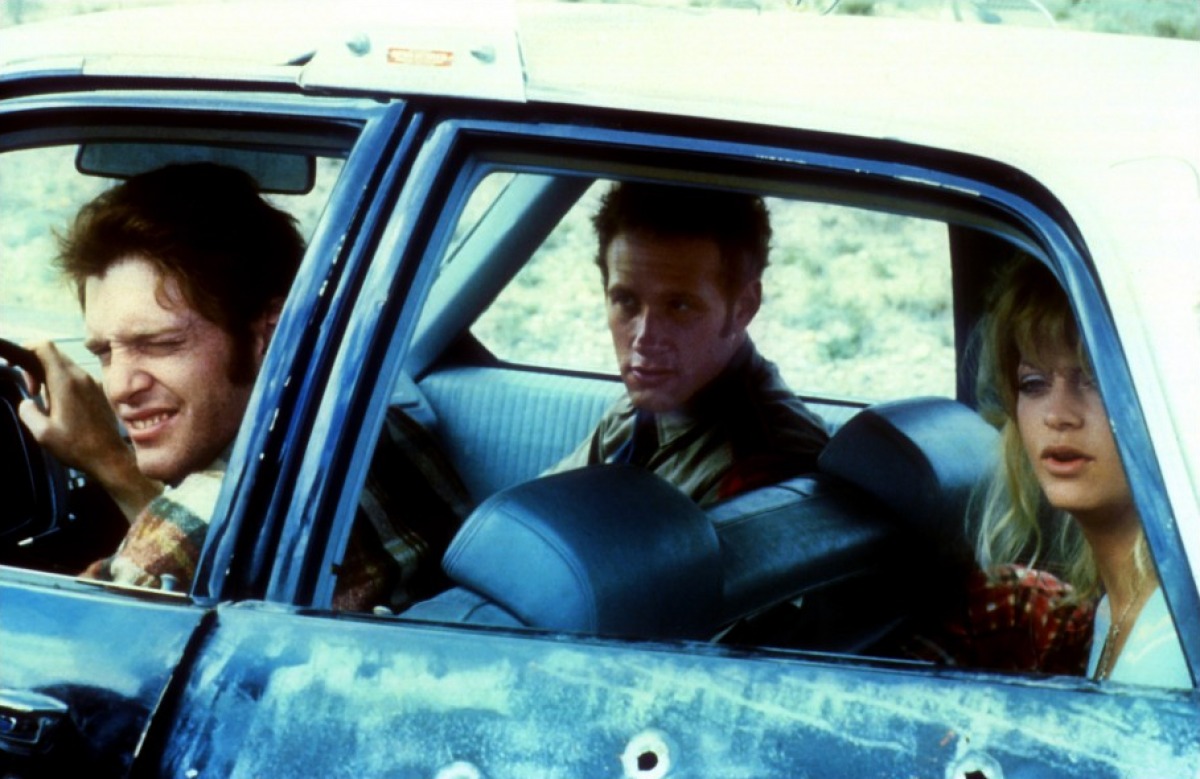
Steven Spielberg’s first fully theatrical release shows signs of the future director to come in its respect for authority and focus on the importance of family. Though it has an edge that means it is not quite a victim to the trite sentimentality which many of his later works (and many of the late 80s revival of road movies for that matter) would fall foul.
The plot follows Lou Jean and Clovis Poplin (Goldie Hawn & William Atherton). Lou Jean is a recently released jail bird who convinces her still incarcerated husband to escape so that they can stop their child from being fostered. Their enthusiastic but inept nature somehow results in them stealing a cop car and holding its driver Patrolman Slide (Michael Sacks) hostage.
What follows is a humorously farcical slow paced car chase, as around 50 police units follow in pursuit. Obviously back in 1974 such overkill would have had more comic absurdity than in a post- reality TV cop chase world, where such images now are likely to bring to mind the OJ Simpson chase of 1994.
A difference between the characters here and those in later Spielberg movies is that they are not completely lovable innocents. Our characters are products of the worst of popular culture mind rot – raised on disposable television and fast food, and the problems encounter are as a result of their own ineptitudes. Spielberg has even commented himself that Lou Jean was actually the “villain” of the piece.
20. Thieves Like Us – Robert Altman – 1974
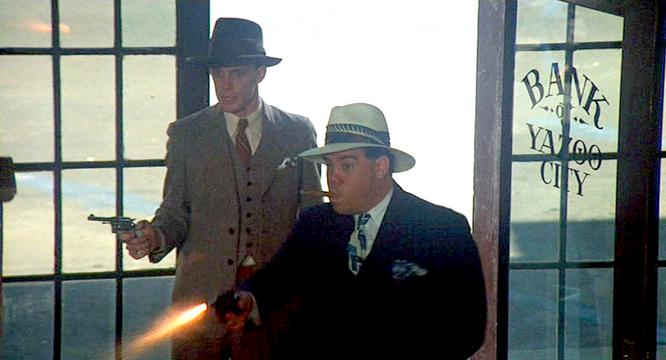
Robert Altman was arguably the quintessential ‘New Hollywood’ director, twisting classic Hollywood genre tropes with his freewheeling, satirical, rulebook burning approach. Loosely plotted ensemble works coasting by on a weed haze charm.
By 1974 he had already slapped his auteurist stamp upon the war movie (MASH), the western (McCabe & Mrs Miller) and the film noir (The Long Goodbye). High on his Pauline Kael sponsored critical peak, one of two movies he would make during this year would tackle the couple on the lam pic.
Thieves Like Us is essentially a remake of Nicholas Ray’s debut They Live By Night (being based on the same Edward Anderson novel). But Altman pulls away from the largely studio bound constraints of Ray’s version to paint a convincing picture of depression era Mississippi with some fantastic location work.
Altman regulars Keith Carradine and Shelley Duvall make a convincing pair as our doomed lovers Bowie and Keechie.